by Peter DeWit
Peter: Hi Safi, thanks for letting me interview you on STCP’s Language Exchange. If I
remember correctly, your first experience with STC was attending one of our classes at the old CEP building. I remember during Covid times, we actually did Language Exchanges while
taking walks outside because it was forbidden to gather in closed spaces. It was a walk and talk exchange. Nowadays, STC has a more structured approach to language learning than those early days. Could you tell us more about what you call it now and why?
Safiullah: Thanks Peter, you know I first joined the Language Exchange way back in 2021 when it was at the Albert Schweitzer Park. At that time, the language exchange included both
English and French. Some attended to improve their French and some their English. I joined to learn French, but I was such a beginner that it was difficult for a language partner to teach me any French.
Peter: That’s funny. How did you even manage?
Safiullah: Well, I don’t remember there being a specific topic to learn back then, so I chose a plan for myself. Whenever I came to the language exchange, I brought a conversation book, which was both in French and English. I would ask a volunteer to help me read and correct my pronunciation. I also joined some other classes offered elsewhere to improve my French language skills.
Peter: Well, it seemed to work, your French has vastly improved. And now you are even more involved than ever with the Language Exchange, right?
Safiullah: Yeah, in fact I was hired by STCP to help with partnerships and to deepen relationships with our beneficiaries. When I started my job I suggested to our leadership team and the language preparation group that we needed to emphasize French language over
English. That’s part of my role, you see, to help the refugees to integrate into French society. You can’t do that without the French language, impossible. This is why we changed the title of our program from the Language Exchange into French Language and Culture Exchange.
Peter: Ah, that’s a nice development. How does a typical event look?
Safiullah: Well, in every session, we try to teach some very basic French for about 20 minutes, led by one of our volunteers. After that we have one-on-one conversation time that lasts for another 25 minutes or so. In this part, we try to match a volunteer with one or two refugees who have the same French level to explain to them the topic
taught or to have a conversation with them on that topic. Fortunately we have dedicated volunteers that work well with our refugees. In general, we ask volunteers to only talk 20 percent of the time. They have to listen 80 percent of the time. We want our beneficiaries to talk and share their culture with our volunteers. What a great way for volunteers to learn something about others’ culture and life! Every refugee has a story, their stories could also change the way we welcome refugees and relate to them.
Peter: So it’s not just about learning French, although that is good, but also about integrating into a western society more easily. You’ve experienced this cultural transition a couple of times in your life, haven’t you? Once in Egypt and now in France. Did this give you special insight into what refugees need to know to succeed? What would you say to a newly arrived refugee?
Safiullah: Refugees need to be curious and ask a lot of questions. They should read a lot too. These are keys to learn about the new culture and succeed in their new life. Most of the refugees are coming from the Middle East or Africa, and I too am one of them. We know that our culture is different from western culture. It does not mean that our culture is bad or western culture is better, it’s just different. Culture is like the norms, rules and spiritualities that we humans have for our lives and it helps us to facilitate our lives. We are not obliged to leave our culture by coming to the western countries, but we should know the host cultures to know how to live here and respect the local people. In every country and every culture, there are some simple keys that we the refugees should all know. For example, the French word “Bonjour” is a magical word in France, it helps facilitate many things, or a simple act like a smile could be helpful. So, we, the refugees, need to learn about the new societies that we are coming to. We encourage asking in our classes.
Peter: So you think this way of learning is useful for everyone?
Safiullah: Yes! You could say it’s a gathering of friends who would like to help each other. It’s a win-win game, everyone wins and can come away with something useful. The volunteer learns a new culture, hears some real life stories, and makes new friends. The beneficiaries learn language skills, find a community and take another step towards integrating into their new society.
Peter: How many volunteer tutors and refugee students are involved?
Safiullah: Well, we are growing a lot. At our first session in September 2023, we had only three beneficiaries and almost ten volunteers. But slowly the number increased, sometimes we have up to 18 beneficiaries. We have some regular beneficiaries who find our sessions useful, and they come regularly. If they have concerns about our sessions, they can share that with me, which helps us to improve the session’s quality. The number of volunteers also varies. Sometimes we have 10 volunteers, sometimes more and sometimes less.
Peter: What about the food? Let’s not forget the food. How do you decide who makes the food and is it an important part of the evening?
Safiullah: Food plays an important role in every gathering. It’s at that time our group of people can practice their new language more and exchange all kinds of ideas. For dinner we encourage our volunteers to bring something to share together. Mostly though, we order from a restaurant, but on occasion we have volunteers that cook. Recently, an Indian restaurant donated food for our program.
Peter: Yum, Indian Food! In closing, what is your greatest joy or greatest joys, as a participant and leader, in this initiative?
Safiullah: There’s not one particular thing that makes me feel joyful, it’s like the whole process, when I see our volunteers come to the language exchange, especially during the cold weather and they do their best to teach and help our friends to learn something, that’s so precious. And the end of the program is also joyful for me, when I see everyone is happy, they are talking, laughing and sharing, it gives me a good feeling that I was a part of this moment.
Peter: Good to hear that, Safi! I almost forgot, one more thing, if any of the other Serve the Cities around the world want to start something similar to what is happening in Paris, what are the most important tips to remember?
Safiullah: That would be awesome. I hope firstly, they could think of this project as a time to learn about others. And start slowly, they should not get discouraged if they don’t have many beneficiaries to kickstart their program. It takes time for the beneficiaries to feel confident in joining . The people who eventually come, the beneficiaries, should feel comfortable. Volunteers play a role in that. Your warmth of welcome is key. Beneficiaries want to be able to share with the volunteers their stories. And lastly, keep it simple. It does not need a scientific method to have a successful session. YOu don’t need highly trained professionals, all you need is volunteers with a good heart who can teach basic language or simply follow the flow of conversation.
Peter: Merci Safi!
Safiullah: Je t’en prie







